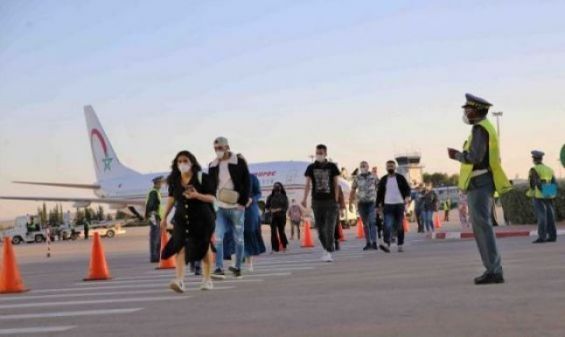While hundreds of stranded Moroccans have benefited from the repatriation operations led by the Moroccan government, several others, who are in vulnerable situations, have been impatiently awaiting for their names to get included in the lists.
As some of them have denounced their exclusion, the Moroccan Association for Human Rights (AMDH) criticized in a recent report the dysfunctions that surrounded aids granted to stranded Moroccans and the methods of elaboration of repatriation lists.
In an open letter sent this week to the Head of Government, Saadeddine El Othmani, the NGO points to «the indifference of Moroccan embassies and consulates» and their «inability to provide the appropriate conditions for this unexpected delay», reported by these Moroccans.
«Repatriation operations have also been characterized, according to information obtained from Spain and Turkey, by the blackout of embassies and consulates», the NGO reported.
«The returnees were chosen without taking into account the selection criteria, by depriving many elderly and chronically ill people from returning to their country».
Criteria set up but not respected ?
As for the aid granted in a number of countries to stranded Moroccans, the NGO believes that it «was characterized by selectivity and favoritism».
For Saïd Tbal, head of the central immigration and asylum commission at AMDH, «the criteria that we often talk about, which targeted senior citizens, those suffering from chronical diseases and others in vulnerable situations, were not effectively respected».
«We have seen, in Malaga for instance, people who are aged more than 60 years and who were not repatriated», he told Yabiladi on Thursday.
In the beginning of this operation, «there were vulnerable cases which were not included despite fitting the criteria». The organizers would have «started with other people, such as the president of a commune in Nador and his relatives. People who have been in less precarious situations than the others», he denounced. For the association, «when you want to set up an operation with criteria, you must prioritize people in distress».
«We do not know how the Moroccan authorities prepared the lists. They were the ones who had the opportunity to approach the embassies and consulates that were included, unlike others. As for support, these are aids that have followed a not-so-transparent and more personal circuit and their distribution has not been fair either and has been marked by irregularities».
Ayoub Khiari, Hicham Zouine and others
Sources close to Yabiladi denounced the «favoritism» that marked these first waves of repatriation. Thus, a Moroccan repatriated from Malaga alleged that at least one person in his group held «Spanish citizenship» and did not «have a type C visa». «I am not against repatriating these Moroccans, but we should not make an exceptions. It's a shame», he said.
The exasperation of Moroccans does not only concern the Iberian kingdom since other European countries are also concerned by the opacity of the selection criteria. Tuesday, Moroccan comedian Mohammed Khiari announced the repatriation of his son, Ayoub, from Belgium. A witness on the spot, however, said that the young man «is not one of the priority» citizens.
The same day, Hicham Zouine, a painter stranded in France, announced his return to Morocco, indicating having landed in Agadir. However, many suffering, elderly and vulnerable Moroccans have not yet had the chance to be on the list of passengers authorized to embark from France on board RAM aircrafts and thus return to their country.





 chargement...
chargement...













